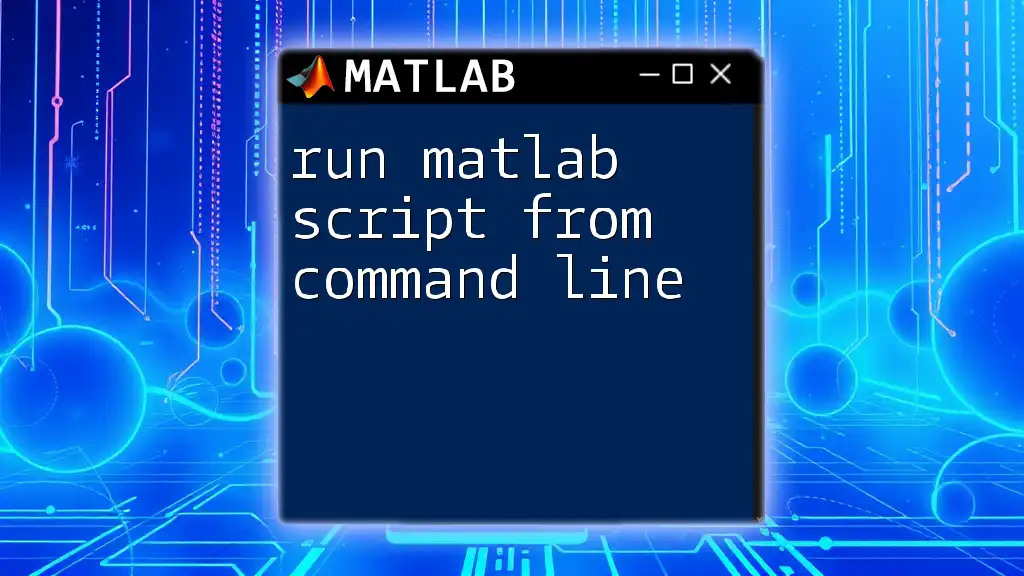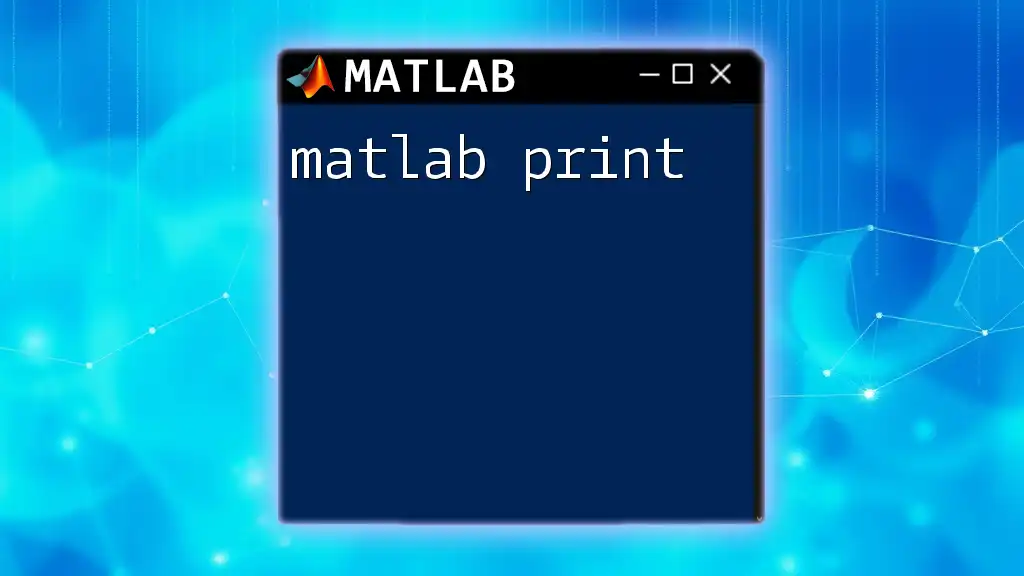A MATLAB script is a file containing a series of MATLAB commands that are executed in sequence, allowing users to automate tasks and perform calculations efficiently.
% Example MATLAB script to calculate the sum of the first 10 integers
sumValue = sum(1:10);
disp(['The sum of the first 10 integers is: ', num2str(sumValue)]);
What is a MATLAB Script?
A MATLAB script is a collection of MATLAB commands that are stored in a file with a `.m` extension. Unlike functions, scripts do not accept inputs or return outputs. They simply execute the commands written within them sequentially. Scripts are particularly useful for automating a series of tasks or computations that you wish to execute multiple times without retyping the commands.

Why Use Scripts?
Using scripts in MATLAB offers numerous benefits. They streamline repetitive tasks, reduce error rates, and enhance workflow efficiency. For instance, an engineer might create a script to process experiment data routinely. Scripts also facilitate easier debugging and testing of code blocks, allowing users to focus on specific sections of their workflow while maintaining organization.

Understanding MATLAB Environment
Getting Started with MATLAB
Before diving into writing MATLAB scripts, it’s essential to familiarize yourself with the MATLAB environment. The interface consists of several components, including the Command Window, Editor, and Workspace. The Command Window is where you can directly execute MATLAB commands, while the Editor is where you create and modify your scripts.
Creating Your First Script
To create your first script on MATLAB:
- Launch MATLAB and navigate to the Editor by clicking on New Script.
- Write your MATLAB commands in the Editor.
- Save your file with a `.m` extension, for example, `my_script.m`.

Structure of a MATLAB Script
Script Syntax and Commands
MATLAB syntax is relatively straightforward, but you must adhere to specific conventions. Variables are assigned using the `=` operator, and each command is typically placed on a new line for clarity. Certain functions and built-in commands can be leveraged to streamline your workflow.
Comments and Documentation
Adding comments to your scripts is crucial for documentation and understanding. You can use the `%` symbol to create single-line comments, while `%{ %}` is used for multi-line comments. For example:
% This is a single line comment
%{
This is a
multi-line comment
%}
Using comments wisely will help you remember the purpose of different code sections while making your scripts understandable by others.

Writing Your First MATLAB Script
Simple Math Operations
To get started with basic operations, consider a simple example where you perform basic arithmetic.
% Simple Arithmetic Operations
a = 5;
b = 10;
sum = a + b;
disp(['Sum: ', num2str(sum)]);
In this script:
- We define two variables `a` and `b`.
- We calculate their sum and store it in the variable `sum`.
- The `disp` function displays the result.
Using Variables and Data Types
MATLAB supports various data types, including integers, floats, and strings. Here is an example of how to declare and use these variables:
% Variable Declaration
num = 20;
txt = 'The number is';
disp(txt);
disp(num);
In the script above:
- We declare a numeric variable `num` and a character string `txt`.
- The `disp` function shows the string and variable values in the Command Window.

Control Flow in MATLAB Scripts
Conditional Statements
Control flow allows you to execute different blocks of code based on conditions. The `if`, `else`, and `elseif` statements help in achieving this. An example is shown below:
% Conditional Example
num = 15;
if num > 10
disp('Number is greater than 10');
else
disp('Number is 10 or less');
end
In this code:
- The condition checks if `num` is greater than 10 and displays corresponding messages.
Loops in MATLAB
Loops are used to repeat a block of code multiple times. MATLAB supports several loop structures, including `for` and `while` loops. For example:
% Looping Example
for i = 1:5
disp(['Iteration: ', num2str(i)]);
end
This loop iterates from 1 to 5, displaying the current iteration number each time.

Functions vs. Scripts
Understanding the Difference
While both functions and scripts are written in `.m` files, they serve different purposes. Functions can take inputs and return outputs, making them reusable. In contrast, scripts execute commands in the workspace directly. Use scripts for simpler tasks and functions for more complex operations requiring inputs and outputs.
Creating a Function
You can incorporate functions into your scripts for improved modularity. Here's a simple function example that computes the square of a number:
function result = square(num)
result = num^2;
end
In this function:
- The `num` variable is the input, and `result` is the output.

Best Practices in Writing MATLAB Scripts
Code Organization and Structure
Organizing your code improves readability and maintainability. Adopt a clear indentation style and separate different sections of your script using comments. For instance, group variable declarations, computations, and outputs distinctly.
Error Handling and Debugging
MATLAB offers debugging tools to help identify issues in scripts. Common errors might include syntax errors, dimension mismatches in operations, or variable name conflicts. Utilizing the MATLAB debugger allows you to set breakpoints and inspect variable states for efficient troubleshooting.
Performance Optimization
To optimize your script's performance, prefer built-in functions over custom loops whenever possible. Built-in functions are typically optimized for speed. Additionally, vectorization can significantly enhance performance by applying operations on entire arrays rather than individual elements.

Practical Applications of MATLAB Scripts
Data Analysis and Visualization
MATLAB excels in data analysis and visualization. For example, you can easily create plots with simple commands. Here’s a basic example of plotting a sine wave:
% Plotting Example
x = 0:0.1:10;
y = sin(x);
plot(x, y);
title('Sine Wave');
xlabel('x');
ylabel('sin(x)');
grid on;
This code generates a plot of the sine function, illustrating the clear visualization capabilities of MATLAB.
Automating Repetitive Tasks
One of the significant advantages of using MATLAB scripts is the ability to automate repetitive tasks, such as data processing, simulations, and batch modifications. By encapsulating your commands into scripts, you can execute complex operations with just a few clicks.

Conclusion
In summary, mastering MATLAB scripts is essential for anyone looking to work efficiently within the MATLAB environment. With their ability to execute a series of commands seamlessly, improve workflow, and organize tasks, scripts empower users to harness the full potential of MATLAB. Continual practice and exploration of MATLAB’s robust features will strengthen your skills and enhance your programming capabilities.

FAQ Section
Common Questions about MATLAB Scripts
-
What is the difference between a script and a function in MATLAB? Scripts execute commands directly in the command window, while functions accept inputs and provide outputs. Functions are better suited for reusable code.
-
How can I debug my MATLAB scripts? Utilize MATLAB's debugging tools by setting breakpoints in your script to pause execution and inspect variable values.
-
What should I do if my script runs slowly? Consider optimizing your code by using built-in functions and employing vectorization techniques to speed up your computations.
Embrace the journey of learning MATLAB scripts, and you will soon unlock new avenues of problem-solving capabilities!

















